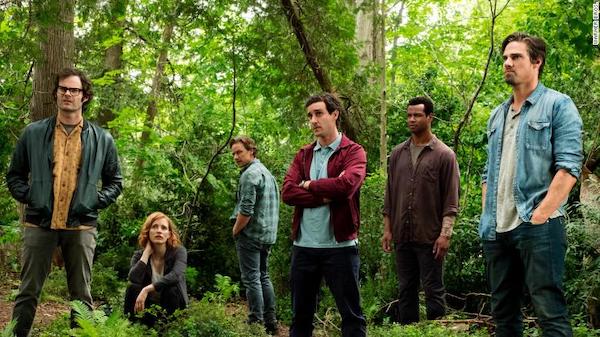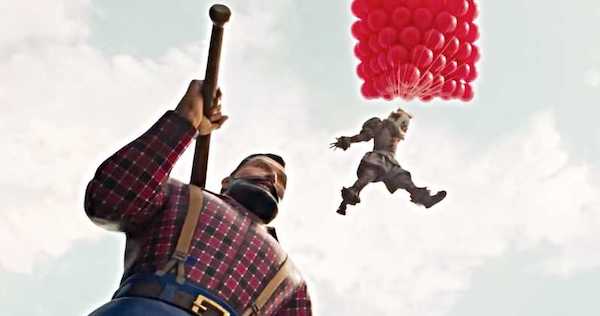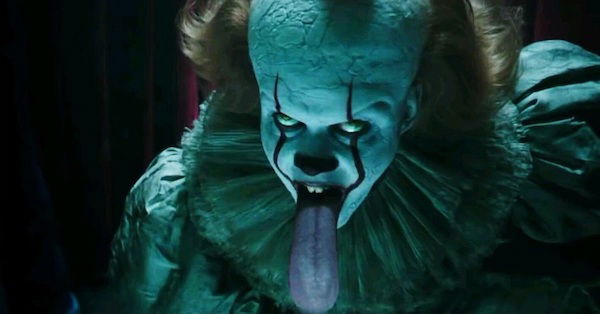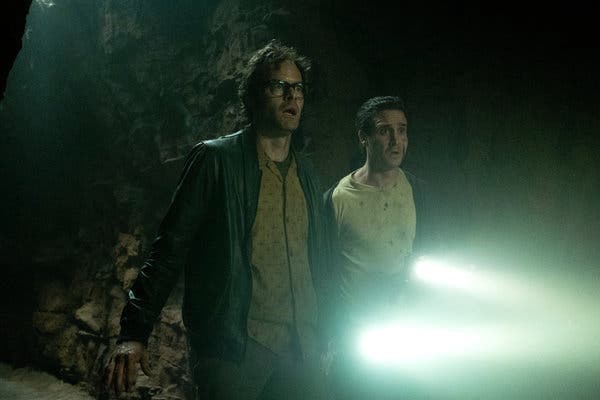I don’t think anyone expected IT (2017) to be the mondo-hit it was, but it struck the perfect balance between comedy and horror with a fantastic cast of mostly unknowns. And it seemed very likely that the cast and crew would be able to carry that success into the second movie. But now its come out and well, I’m not so convinced that lightning has struck twice.
IT Chapter Two finds all of our characters now aged 40, having moved on in their lives in various ways. Bill is a successful author even though everyone hates his endings, Bev is a successful fashion designer in an abusive marriage, Ben is a famous architect, Richie is a stand-up comic, Eddie is a risk-assessment expert, and Stan…well, he’s married and likes puzzles. Mike was the only one to stay behind in Derry, and thus is the only one who clearly remembers what happened to them that fateful summer.
When Mike starts to notice children going missing in the town 27 years later as Ben originally predicted, he calls in the Losers. Once they all reconvene back in Derry, they are immediately attacked by IT, as it shows them terrifying visions and alludes through their fortunate cookies that Stan has killed himself to avoid having to go to Derry again. I won’t go any further into the plot, other than to say that it follows the novel pretty closely save for a few details and the entire third act, which will we get into under the spoiler header if you’re interested.
The standout performances this time come from Bill Hader and James Ransone as Ritchie and Eddie, which is funny considering that their young counterparts Finn Wolfhard and Jack Dylan Grazer were also the best part of IT (2017). Hader is a pitch-perfect Ritchie with his crude humor, comedic timing, and surprisingly deep emotional performance at the end of the film. Ransone also has killer timing but also plays neurotic in such an endearing way that you can’t help but care. The biggest surprise for me is that Wyatt Oleff, who plays young Stan, really got to shine in the flashbacks and really made you care about him, even though he got very little time in the first film. James McAvoy, Jessica Chastain, Jay Ryan, and Isaiah Mustafa work as Bill, Bev, Ben, and Mike, respectively, but they occasionally feel a little wooden (though that could also be some of the dialogue’s fault).
Director Andy Muschietti continued the dark but seemingly harmless aesthetic that made the first film so eerie. It must be said that there are some fantastic special effects at play here, especially in the torment of the Losers by IT. There’s a scene with a leper in the pharmacy with Eddie that is as freaky as it is hilarious, and a dual torment with Ben and Beverly that really makes you feel trapped. Also, who knew a giant Paul Bunyan would be so horrific?
One of the big problems with IT Chapter Two is the constant segmentation. By having the entire first film take place in the past, we are able to get a smooth, streamlined story, avoiding any feeling of stop-and-start. However, in IT Chapter Two, there are a lot of flashbacks, which ground the story to a dead stop so we can get magical Maguffins that are ultimately meaningless. And the thing is there’s no reason for doing it this way. If they were always going to break IT up into two films, why not have those flashback scenes happen in film one and then just touch back on them in film two? Marvel does this all the time with their connected universe. Instead, the movie feels like they shoe-horned in more scenes with the kids because that’s what was popular about film one. What I think would have worked better would be scenes of the adults before returning to Derry and communicating again, learning to be a team once more, keeping the narrative flowing in one timeline rather than two.
I know there’s been some conversation around the moving opening scene, in which a gay couple is attacked by a bunch of bullies, wherein one of them is thrown into the river and subsequently eaten by IT. Here’s the thing, I think it is important that this happens. Yes, say what you will about “burying your gays” but it is true to the novel (which starts in a very similar way) but also reminds us that Derry is just as small-minded, hateful and violent a place in 2019. Time moves on, but Derry does not, in part because of IT’s influence but also because that’s the world we live in.
So there are a few things we need to talk about that are filled with spoilers, specifically about the ending so be forewarned!
Throughout the entire movie, the joke has been that Stephen King can’t write endings. And as an avid King fan, I will say that this is true only about 50% of the time. Some of them land, some of them flop, and sometimes the adaptations don’t quite translate the endings from page to screen. Bill, the Stephen King stand-in, is constantly shit on for not writing good endings by just about everyone. Hell, there’s even a Stephen King cameo where he mocks Bill for having terrible endings, so we know he’s in on the joke. You can tell then that the movie is going to have a different ending that the book/miniseries, which was reviled. The alternate solution present by screenwriter Gary Dauberman was…severely lacking.
In the original, the Losers Club performs the ritual of Chud, which ends up weakening and killing IT. However, in the movie, they try to perform the ritual but it fails, as it had the first time it was performed. Instead, the Losers are able to defeat IT by, and I kid you not, bullying it down to size and then pulling out and crushing its heart. So what’s the message here? That bullying is useful? Any enemy can be conquered if you just act like an asshole to it?
I get that the tradition “love conquers all” ending, both in IT and as a trope, is cheesy and overdone. However, this ending shits all over the entire narrative plot of both the book and film. The whole point is that the group’s love for each other was stronger than the hate and fear that kept Derry under IT’s grasp, and that their connection was so deep that even being split up wasn’t enough to stop them. I mean the movie even points to this through Stan’s suicide and his letter to the club, saying that he wanted to be sure that group would come together and be strong. So then how does collectively screaming at IT until it literally deflates speak to that at all? If anything, it argues that only by being bullies and beating IT at its own game is the answer. It is not their love for each other that wins, it’s their selfish hate of IT..which is a bad ending.
On the flip side, the other major change is that Ritchie’s big secret is that he’s gay and is in love with Eddie. I personally really like this change, especially because they did it right. They could have easily made vague allusions one way or the other about Ritchie’s sexuality, but they came out and made it text rather than subtext. Bill Hader’s whole physicality when he’s holding Eddie’s dead body, and his moment of grief, once they are outside, is just gut-wrenching. It’s also pretty hard to ignore the chemistry between both young and old Ritchie and Eddie, so it made sense for the story as well. While I don’t think the ending is the best fit for this story, the way they wrapped up all the storylines does give your heartstrings a little tug.
Ultimately, IT Chapter Two couldn’t end the story as strong as it began. There was too much to get through and it didn’t play out as smoothly as it could have. There are a lot of great ideas and strong performances, but the constant shifting of the timeline draws out the entire second act.
Summary
While IT Chapter Two provides for an ending to 2017’s most enthralling horror flick, it’s unable to keep the momentum fully flowing. With a plot that stops and starts, even a strong cast and amazing direction from Andy Muschietti can’t keep this nearly three-hour beast from feeling more than just “good.”







